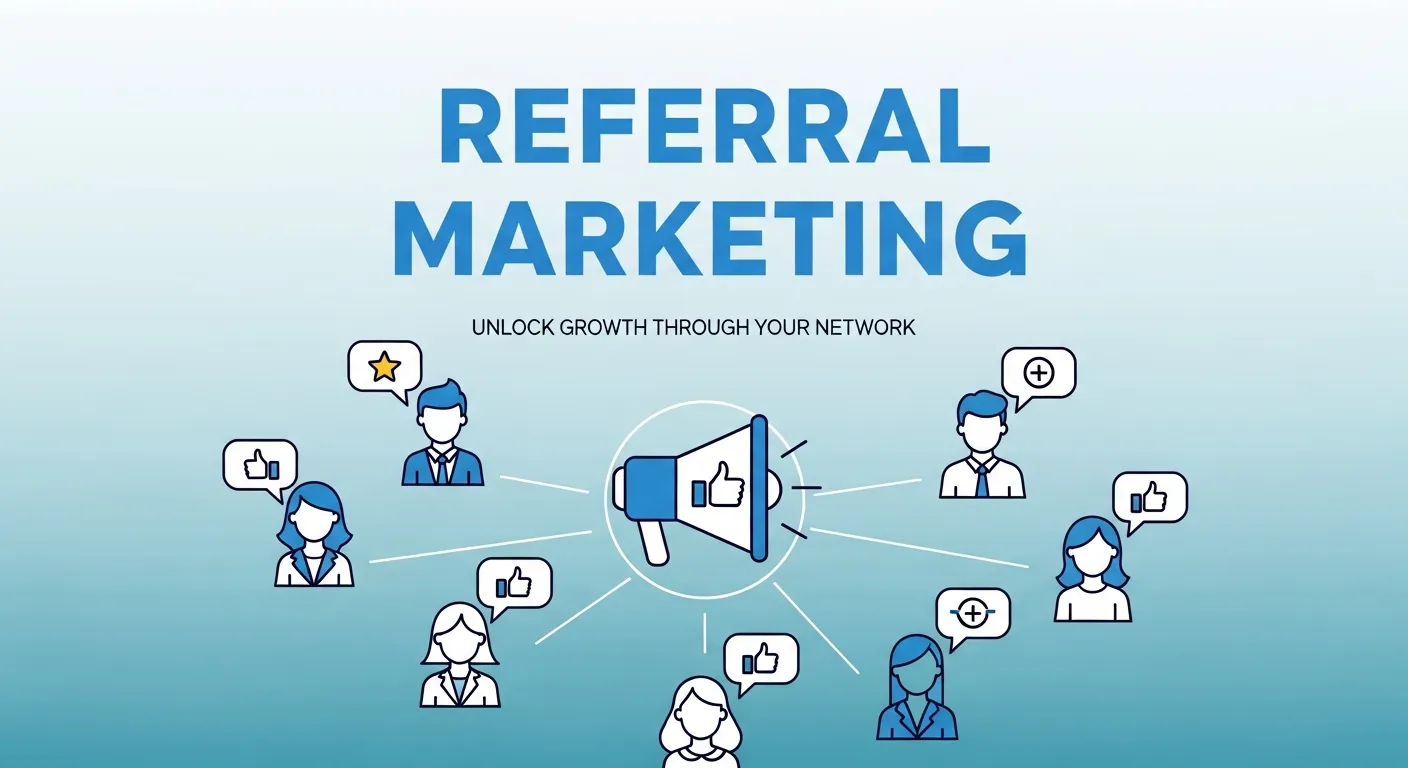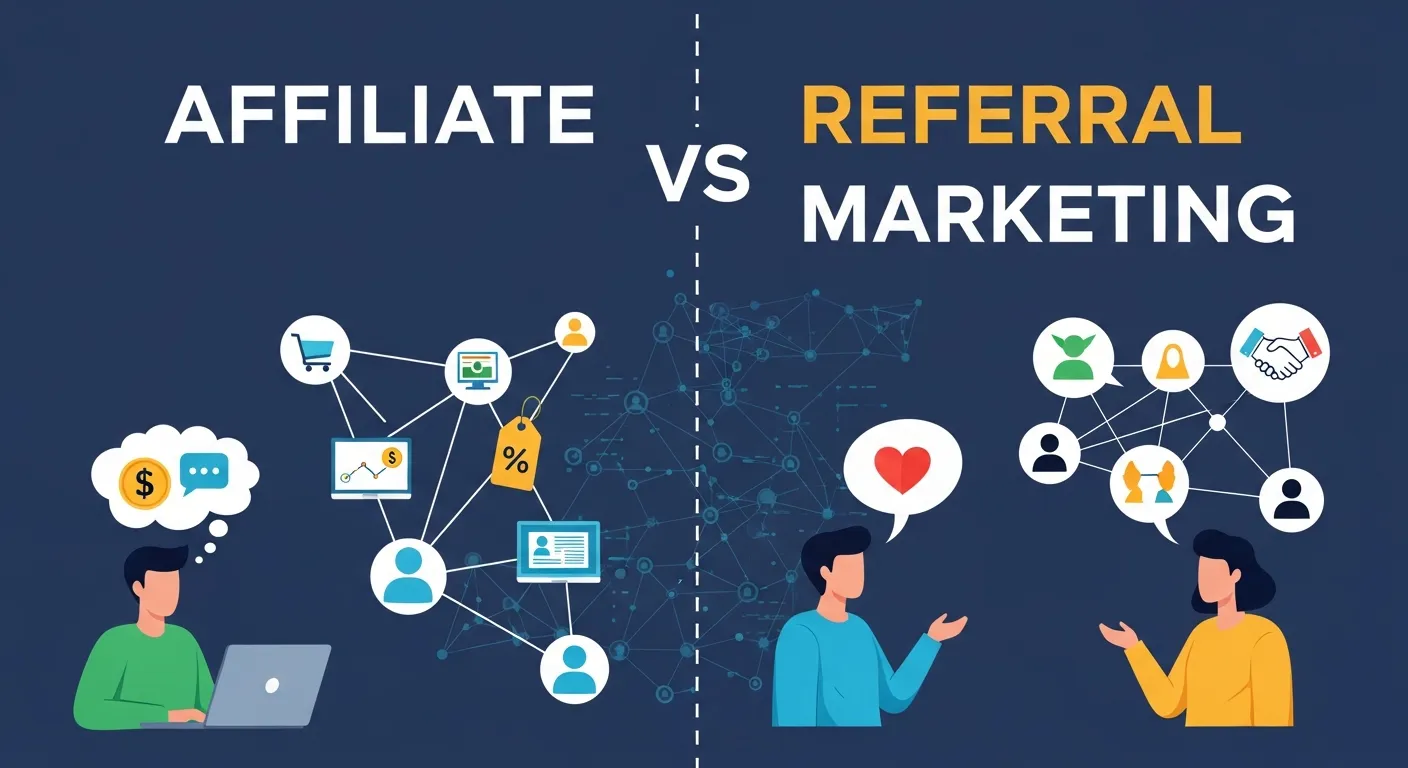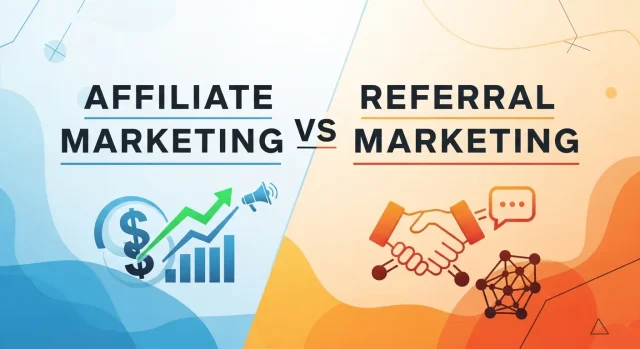Affiliate marketing uses third-party promoters earning commissions to reach new audiences, while referral marketing leverages existing customers’ trust with incentives. Choosing—or combining—both depends on goals, audience, costs, and growth strategy for sustainable long-term business success.
When it comes to increasing your business, you can take advantage of others to spread the word about your products or services, leading to significant results. Two popular strategies for this purpose are associated with marketing and referral marketing. But when they can look at first glance, they are designed to achieve different goals and work in different ways.
This blog will help you understand the ins and outs of both affiliate and referral marketing, discover your differences, and guide you in choosing the right approach for your business.
What Is Affiliate Marketing?

Affiliate marketing is a performance-based strategy where businesses partner with affiliates (individuals or companies) to promote their products or services. Affiliates earn a commission for every sale or lead they drive through their promotional efforts.
How Affiliate Marketing Works
- A business sets up an affiliate program and provides unique links or codes to affiliates.
- Affiliates use these links to promote the products or services through blogs, websites, social media, emails, or other marketing channels.
- When a customer clicks on the affiliate’s link and completes a desired action (e.g., making a purchase), the affiliate earns a commission.
Benefits of Affiliate Marketing:
- Scalability: Businesses can work with multiple affiliates, significantly expanding their reach.
- Cost-Effectiveness: Commissions are paid only for actual results, like sales or leads, making it a low-risk investment.
- Expert Promotion: Affiliates are often niche experts or influencers who have a loyal following, meaning they can target audiences effectively.
Examples of Affiliate Marketing
- Amazon Associates: Amazon’s affiliate program allows individuals to promote products from its vast catalog and earn commissions for every qualifying sale.
- Tech Review Blogs: A blog reviewing gadgets includes affiliate links directing readers to an online store for purchase, earning the blogger a commission.
Affiliate marketing is especially popular in e-commerce, SaaS, and industries where customer acquisition often involves extensive online research.
What Is Referral Marketing?

On the other hand, referral marketing focuses on encouraging your existing customers to recommend your products or services to their friends, family, and colleagues. The idea here is to leverage trust and personal relationships to drive new business.
Visit to know what The Best Referral Marketing Strategies to Boost Your Business
How Referral Marketing Works
- A business sets up a referral program and offers incentives (e.g., discounts, free products, store credits) to existing customers.
- Customers share a unique referral link or code with their contacts.
- When a referred person completes a desired action (e.g., signs up or makes a purchase), both the referee and referrer may receive a reward.
Benefits of Referral Marketing:
- High Trust Levels: Recommendations typically come from someone the new customer knows personally, which builds trust quickly.
- Customer Loyalty: Rewarding your existing customers strengthens relationships and improves retention.
- Low Marketing Costs: Your customers act as your marketers, reducing the need for substantial upfront investment.
Examples of Referral Marketing
- Dropbox: Dropbox’s iconic referral program rewarded users with extra storage space for every friend they referred to the platform.
- Uber: Uber offered ride credits to both referrers and referees, encouraging rapid user growth.
Referral marketing works especially well for businesses in service-based industries, where personal trust is key to conversion.
Affiliate vs Referral Marketing: Key Differences
While both strategies involve promoting products or services, their approaches, audiences, and goals are quite different. Here’s a quick comparison:
|
Aspect |
Affiliate Marketing |
Referral Marketing |
|---|---|---|
|
Audience |
Bloggers, influencers, niche marketers, and websites |
Existing customers |
|
Motivation |
Commission-based (monetary rewards) |
Incentives like discounts, credits, or free perks |
|
Reach |
Broad; focuses on new audiences |
Targeted; relies on the customer’s personal network |
|
Trust Level |
May or may not involve personal trust |
High trust, as it comes from familiar sources |
|
Cost Structure |
Commission-based; pay-for-results |
Lower costs via customer-driven promotion |
|
Complexity |
Requires setting up well-structured affiliate programs |
Easier to design and implement |
Which Strategy Is Right for You?

Here are some key points to help you determine which approach best aligns with your goals:
Choosing between affiliate and referral marketing depends on your business goals, audience, and growth stage. Both strategies are effective, but they deliver results in different ways.
Choose Affiliate Marketing if:
- You want to reach new audiences and expand your brand’s visibility quickly.
- Your business operates online in a competitive or research-driven market.
- You’re open to working with bloggers, influencers, and content creators who can promote your products at scale.
- You prefer a performance-based model where you pay commissions only for actual results.
Choose Referral Marketing if:
- You already have a loyal customer base willing to recommend your brand.
- Trust and personal relationships strongly influence buying decisions in your industry.
- You want to improve customer retention while acquiring new users.
- You’re looking for a cost-effective way to grow through authentic word-of-mouth.
Use Both Affiliate and Referral Marketing if:
- You want a balanced growth strategy that combines reach and trust.
- Affiliate marketing can help you attract new prospects, while referral marketing strengthens loyalty and drives high-quality conversions.
- Your goal is sustainable, long-term growth built on both awareness and customer advocacy.
Affiliate and Referral Marketing: Pros and Cons :
Affiliate Marketing Pros & Cons
- Pros: Scalability, reach, predictable tracking
- Cons: Fraud risk, lower trust, higher commissions
Referral Marketing Pros & Cons
- Pros: High trust, better retention
- Cons: Depends on existing users, slower scaling
Tools & Software for Affiliate and Referral Marketing
Choosing the right tools can make managing your affiliate and referral marketing programs far easier, more efficient, and more measurable. Below are popular types of platforms and examples to help you run successful campaigns.
Top Affiliate Marketing Tools
Affiliate marketing tools help you recruit affiliates, track performance, manage payouts, and optimize performance.
1. Affiliate Management Platforms
These platforms let you set up, track, and manage affiliate programs in one place:
- Affiliate tracking dashboards
- Automated commission payouts
- Customizable affiliate links
2. Influencer & Affiliate Networks
These connect brands with influencers, affiliates, and content creators:
- Find niche partners
- Automated agreements
- Performance insights
3. Analytics & Tracking Tools
To measure clicks, conversions, revenue, and ROI:
- Track affiliate link performance
- Attribution reporting
- Real-time dashboards
4. Payment & Payout Solutions
To pay affiliates quickly and accurately:
- Automated commission payments Integration with accounting tools
Top Referral Marketing Tools
Referral tools help automate referral campaigns, track shares and conversions, and deliver rewards efficiently.
1. Customer Referral Software
These solutions let you:
- Create referral campaigns quickly
- Generate unique referral links or codes
- Automate reward delivery
2. Loyalty & Rewards Platforms
Referral and loyalty features combined:
- Points, credits, perks
- Custom reward structures
- Segmented reward campaigns
3. Messaging & Sharing Integrations
Boost sharing through:
- SMS
- Social media
- In-app prompts
Recommended Tools by Use Case
| Use Case | Best Tool Type | Why It’s Useful |
|---|---|---|
| Manage affiliate partners | Affiliate management platform | Centralized tracking + payouts |
| Scale influencer promotions | Affiliate networks | Access to large partner pools |
| Launch referral programs fast | Referral marketing software | Ready templates + automation |
| Improve loyalty + referrals | Loyalty & rewards platforms | Combines retention and advocacy |
| Track performance | Analytics & tracking tools | Understand ROI and optimize |
Affiliate and Referral Marketing Use Cases by Industry
Different industries benefit from affiliate and referral marketing in unique ways. Understanding how each strategy works across sectors can help you choose the right approach—or combine both—for maximum impact.
E-commerce
In e-commerce, affiliate and referral marketing play complementary roles.
- Affiliate marketing works well with product reviews, deal websites, influencers, and comparison blogs to drive high-volume traffic.
- Referral marketing encourages repeat buyers to recommend products to friends in exchange for discounts or store credits.
Best approach: Use both—affiliates for acquisition, referrals for retention.
SaaS & Software
For SaaS businesses, affiliate and referral marketing are powerful growth drivers.
- Affiliate marketing attracts new users through tech bloggers, YouTubers, and SaaS review platforms.
- Referral marketing drives high-quality signups by rewarding existing users with credits, upgrades, or extended trials.
Best approach: Referral marketing for retention + affiliates for scale.
Fintech & Financial Services
In fintech, trust is critical, making affiliate and referral marketing highly effective when used correctly.
- Affiliate marketing supports lead generation through financial comparison sites and expert content.
- Referral marketing builds trust by leveraging peer recommendations for apps, wallets, and investment platforms.
Best approach: Referral marketing for trust-based conversions, affiliates for lead volume.
EdTech & Online Learning
EdTech companies benefit greatly from affiliate and referral marketing.
- Affiliate marketing partners with educators, bloggers, and influencers to promote courses and tools.
- Referral marketing motivates students to invite friends with course discounts or free lessons.
Best approach: Referral marketing for community growth, affiliates for reach.
Service-Based Businesses
For service-based brands, affiliate and referral marketing work differently.
- Affiliate marketing is less common but can work with agencies or consultants promoting services.
- Referral marketing is highly effective due to personal trust and relationship-based decisions.
Best approach: Referral marketing dominates.
Mobile Apps & Subscriptions
In travel, affiliate and referral marketing support both discovery and loyalty.
- Affiliate marketing increases installs via content creators and app review sites.
- Referral marketing boosts viral growth with in-app rewards and social sharing.
Best approach: Referral marketing for viral loops + affiliates for steady acquisition.
Travel & Hospitality
Travel & Hospitality use affiliate and referral marketing to generate high-value leads.
- Affiliate marketing thrives through travel blogs, influencers, and booking platforms.
- Referral marketing encourages repeat travelers to recommend services for credits or discounts.
Best approach: Strong affiliate focus with referral support.
B2B Businesses
B2B companies use affiliate and referral marketing to generate high-value leads.
- Affiliate marketing works through industry experts, partners, and consultants.
- Referral marketing leverages client trust for high-value, long-term contracts.
Best approach: Referral marketing for quality leads, affiliates for visibility.
Affiliate and Referral Marketing Metrics to Track

Tracking the right metrics is essential to measure the success of Affiliate and Referral Marketing programs and ensure they deliver sustainable growth. Without proper measurement, businesses risk overspending, missing optimization opportunities, and failing to understand what truly drives conversions. Below are the most important metrics to track for Affiliate and Referral Marketing, along with why each one matters.
Conversion Rate
Conversion rate is one of the most critical metrics in Affiliate and Referral Marketing. It measures the percentage of users who complete a desired action—such as a purchase, sign-up, or download—after clicking an affiliate link or referral invitation. A higher conversion rate indicates that your affiliates or customers are reaching the right audience with relevant messaging. Comparing conversion rates between affiliate and referral channels can also reveal which strategy generates higher-quality leads.
Cost Per Acquisition (CPA)
CPA calculates how much it costs to acquire a new customer through Affiliate and Referral Marketing. In affiliate marketing, this includes commissions and platform fees, while in referral marketing, it includes incentives and rewards. Tracking CPA helps you determine whether your campaigns are profitable and which partners or customer segments provide the best return on investment.
Click-Through Rate (CTR)
CTR measures how many people click on affiliate links or referral invitations compared to how many see them. In Affiliate and Referral Marketing, a low CTR may signal weak messaging, poor placement, or lack of relevance. Monitoring CTR helps optimize promotional content, creatives, and call-to-action strategies.
Customer Lifetime Value (CLV)
Customer Lifetime Value shows the total revenue a customer generates over time. In Affiliate and Referral Marketing, this metric is especially important because referral customers often have higher CLV due to trust-based acquisition. Comparing CLV across affiliate- and referral-acquired users helps determine which channel delivers long-term value rather than just short-term conversions.
Referral Rate
Referral rate measures how often existing customers share referral links or codes. This metric is unique to Affiliate and Referral Marketing, especially referral programs. A high referral rate indicates strong customer satisfaction and advocacy, while a low rate may signal that incentives or messaging need improvement.
Affiliate Performance Metrics
For affiliate programs, it’s essential to track individual affiliate performance. Metrics such as revenue per affiliate, average order value, and conversion rate per partner help identify top-performing affiliates. In Affiliate and Referral Marketing, focusing on high-performing partners allows businesses to strengthen profitable relationships and remove underperforming ones.
Reward Redemption Rate
In referral marketing, the reward redemption rate shows how many users claim their incentives after a successful referral. This metric helps assess whether rewards are attractive and easy to redeem. A low redemption rate may suggest unclear program rules or unappealing incentives within your Affiliate and Referral Marketing strategy.
Fraud and Quality Metrics
Fraud prevention is critical in Affiliate and Referral Marketing. Tracking metrics like duplicate referrals, suspicious traffic spikes, or unusually high conversion rates can help identify fraudulent activity. Maintaining data quality ensures accurate reporting and protects your marketing budget.
Return on Investment (ROI)
ROI is the ultimate metric for Affiliate and Referral Marketing success. It compares total revenue generated from affiliates and referrals against total costs. A positive ROI confirms your strategy is profitable and scalable, while a declining ROI signals the need for optimization.
Elevate Your Marketing Strategy Today

Understanding the difference between affiliate and referral marketing is crucial in executing a strategy that aligns with your business objectives. Both are powerful tools that can drive growth, but how they fit into your overall plan depends on your industry, goals, and resources.
Want to learn more about optimizing your marketing strategy? Check out this article on how businesses use referral marketing successfully for actionable insights. Whichever path you choose, remember the ultimate goal is to build a sustainable connection with your audience that fosters trust and loyalty.
In today’s competitive digital landscape, simply having a great product or service isn’t enough—you need the right marketing strategy to amplify your reach and accelerate growth. Understanding Affiliate and Referral Marketing is a critical step in building a strategy that truly aligns with your business objectives. While both approaches rely on word-of-mouth influence, they operate in distinct ways and serve different roles within a broader marketing ecosystem.
Conclusion
Affiliate and referral marketing are both powerful growth strategies, but they serve different purposes. Affiliate marketing helps businesses reach new audiences through performance-based partnerships, while referral marketing capitalizes on customer trust to drive high-quality leads. Choosing the right approach—or combining both—depends on your business goals, audience, and resources. When used strategically, these methods can work together to create sustainable growth, stronger customer relationships, and long-term brand loyalty.
FAQ: Affiliate and Referral Marketing
1. What is the main difference between affiliate and referral marketing?
Affiliate marketing relies on third-party promoters—such as bloggers, influencers, and websites—who earn commissions for sales or leads. Referral marketing relies on existing customers recommending your business to their personal network, often in exchange for rewards like discounts or credits.
2. Which is more cost-effective: affiliate or referral marketing?
Referral marketing is generally more cost-effective because it leverages existing customers and provides rewards only when referred users convert. Affiliate marketing can also be low-risk since you pay for results, but commissions may be higher depending on your niche.
3. Which strategy is better for small businesses?
Small businesses with a loyal customer base often benefit more from referral marketing. However, businesses looking to expand their online presence quickly may find affiliate marketing more effective for reaching new audiences.
4. Can a business use both affiliate and referral marketing at the same time?
Yes. Many companies use both strategies to maximize growth. Affiliate programs help attract new audiences, while referral programs strengthen customer loyalty and encourage existing customers to spread the word.
5. What type of incentives work best for affiliate marketing?
Affiliates are typically motivated by monetary rewards such as commissions, recurring revenue, or performance bonuses. These incentives appeal to influencers, bloggers, and niche marketers who generate income from their promotional efforts.
6. What incentives work best for referral marketing?
Referral programs work best with incentives like discounts, credits, free products, loyalty points, or exclusive perks. Because referrals come from personal connections, even small but meaningful rewards can be effective.
7. Which strategy builds more trust: affiliate or referral marketing?
Referral marketing generally builds more trust because recommendations come from someone the referee personally knows. Affiliate marketing can build trust, too, especially when affiliates are respected experts or influencers in a specific niche.
8. Is affiliate marketing harder to set up than referral marketing?
Yes. Affiliate marketing typically requires program setup, tracking software, commission rules, affiliate recruitment, and ongoing management. Referral marketing programs are often simpler and can be implemented using basic referral tools or platforms.
9. Who benefits most from affiliate marketing?
Businesses in industries where consumers rely heavily on research or expert opinions—such as tech, SaaS, e-commerce, and financial products—benefit most from affiliate marketing.
10. What type of businesses benefit most from referral marketing?
Service-based businesses, subscription services, apps, and brands with strong customer loyalty often see excellent results from referral marketing, as trust and personal recommendations play a major role in conversions.
Learn more about: B2B vs B2C Referral Marketing: Key Differences in Approach








